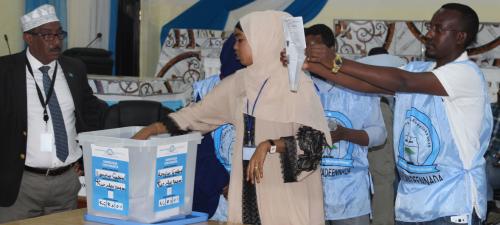Somalia: UN urges steps to ensure future elections not ‘marred’ by rights abuses seen in recent polls
In a report released on Monday, the United Nations urged Somalia to take steps to ensure future elections are not marred by the human rights violations and abuses committed during the 2016-2017 electoral process.

Electoral officials count votes during the electoral process to choose members of the Lower House of the Federal Parliament in Baidoa, Somalia in November 2016.
“Insecurity, weak justice institutions, and an insufficient human rights protection system contributed to the lack of accountability for human rights violations throughout Somalia,” the report says, looking back at the 2016 polls and calling for prompt action to bolster human rights protections ahead of the 2020-2021 electoral process.
The report – from the UN Assistance Mission in Somalia (UNSOM) and the UN human rights office (OHCHR) – details violations and abuses by State security forces, including the police and intelligence agencies, and non-State groups, including Al Shabaab, before, during and after parliamentary and presidential elections held in late 2016 and early 2017.
While it documents the killing of 44 clan leaders and electoral delegates during that period, it reveals that only two of these reported killings were investigated and prosecuted.
As such, the joint report calls for “prompt, independent and impartial investigations into human rights violations and abuses committed in the context of the electoral process.”
In addition, the report highlights repeated attacks, intimidation and other forms of harassment against reporters, human rights defenders and political leaders, noting that this violence “impeded the free flow of information” and undermined “the ability of citizens to benefit from and contribute to democratic processes” in an informed manner.
“As Somalia continues the arduous task of building institutions and constructing peace, respect for human rights must be at the core of this enterprise,” said UN High Commissioner for Human Rights, Zeid Ra’ad Al Hussein.
"This includes guaranteeing all public freedoms, such as the rights to freedom of opinion and expression, and of peaceful assembly and association," he stressed, adding that “it is essential that victims’ rights to remedy and reparation are respected”.
Because conditions for universal suffrage were not in place in 2016, a system of indirect suffrage was used with 275 electoral colleges of 51 delegates each. The colleges elected the 275 members of the House of the People, who then elected the new President, Mohamed Abdullahi Mohamed, on 8 February 2017.
While this system allowed for a more diverse parliament, with half its members newly elected and women’s representation at 24 per cent (compared to 14 per cent in 2012), “more needs to be done” for the next elections, said the report.
“Women, persons with disabilities, minority clans and civil society groups had limited or no access to the electoral process as it was a political process based on clan distribution,” said Michael Keating, the head of UNSOM. “Looking ahead to elections due in 2020-2021, we are urging the Government to establish a system of representation that is inclusive of all citizens, based on the one person, one vote principle.”
In addition, given that in 2016 the list of candidates included former warlords and a military commander accused of war crimes, the report recommends that candidates be vetted regarding their respect for human rights.
Source:United Nations
- 298 reads
Human Rights
Ringing FOWPAL’s Peace Bell for the World:Nobel Peace Prize Laureates’ Visions and Actions

Protecting the World’s Cultural Diversity for a Sustainable Future

The Peace Bell Resonates at the 27th Eurasian Economic Summit

Declaration of World Day of the Power of Hope Endorsed by People in 158 Nations

Puppet Show I International Friendship Day 2020

